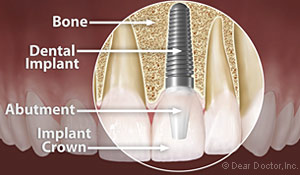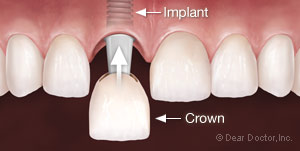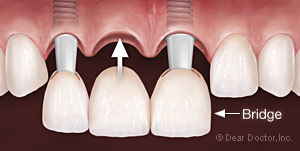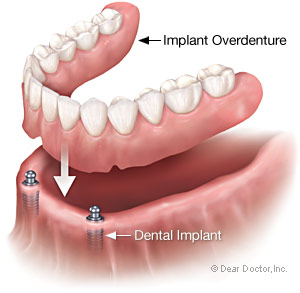
As your trusted Lancaster dentist, it is our job to tell you when a tooth cannot be saved despite your excellent oral-hygiene practices and commitment to routine exams and cleanings. Whether you’re facing an extraction or have lost teeth because of an unexpected accident or decay, at Douglas B. Weber, D.D.S., we offer implant dentistry and dental implants — a permanent, restorative solution that will give you back your beautiful, natural-looking smile.
What Is a Dental Implant?
In implant dentistry, a dental implant consists of a small, screw-shaped, titanium post that replaces the root of a missing tooth. It is covered by a porcelain crown that looks and feels just like your old tooth. It requires a minor surgical procedure in which the post is inserted into the jawbone where the missing tooth once was and is left to heal for a set period of time. While it heals, the bone fuses to the implant, and then the tooth-like crown is attached.
Why Dental Implants?
Implant dentistry is quickly gaining popularity. Dental implants have a 95 percent tooth-replacement success rate and correct even the most severe problems associated with missing teeth. They are a safe and effective method for replacing missing teeth with new, natural-looking, permanent teeth, and they help preserve the tooth-supporting bone that naturally deteriorates when a tooth is lost, thereby sustaining the integrity of your facial structure.
For many, dental implants offer a much-needed reprieve from ill-fitting, uncomfortable dentures or retainers with false teeth. At Douglas B. Weber, D.D.S., we offer three primary tooth-replacement options. Depending on the number of missing teeth, certain implant options work better than others:
- Single-tooth replacements have the highest success rate, and because they will never decay or need root canal treatments, they are the best long-term investment for replacing a single tooth.
- Multitooth replacements are similar to bridges and are commonly used when three or more teeth in a row are missing. A bridge must connect to a natural tooth, which often becomes weak and starts to decay. With tooth implants, the surrounding teeth are not affected.
- Implant-supported dentures replace entire jawlines along the top or bottom (or both) rows. These dentures lock into place so they will not shift around in the mouth or fall out during jaw movement.
(Click images for larger view)
Just like your natural teeth, with proper maintenance and cleaning, dental implants can last forever. As part of his job as your dental implant specialist, Dr. Douglas B. Weber ensures the longevity of your dental work by guiding you through the maintenance and care of your implants at each stage, both immediately after and long after the procedure.
FAQ
Q. Are dental implants the best tooth-replacement option?
A. Dental implants are the best tooth-replacement option for patients who want a permanent, natural-looking solution. They are highly durable and deter bone loss, which protects the integrity of your facial esthetics.
Q. How much do dental implants cost?
A. The price of dental implants varies widely according to the size, location, and condition of the remaining jawbone. Contact Dr. Weber today to schedule a consultation and find out more about pricing for your unique dental situation.
Q. Are dental implants permanent?
A. Yes, dental implants are a permanent solution for missing teeth.




